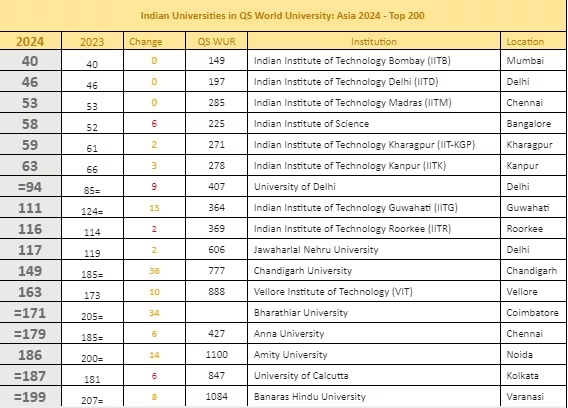Important Facts For Prelims
QS World University Rankings: Asia 2024
- 11 Nov 2023
- 4 min read
Why in News?
Recently, the global higher education think-tank Quacquarelli Symonds has released the QS Asia University Rankings: Asia 2024, including 148 universities from India in the comprehensive list of 856 universities across Asia.
What is QS World University Rankings?
- QS World University Rankingsare released annually by Quacquarelli Symonds (QS).
- The rankings evaluate the performance and quality of universities worldwide.
- The methodology considers indicators such as academic reputation, faculty-student ratio, employer reputation, sustainability, employment outcomes, international research network, citations per faculty, international faculty ratio, and international student ratio.
- They provide rankings by subject, region, student city, business school, and sustainability.
What are the Key Highlights of the QS World University Rankings: Asia 2024?
- Top Ranking Universities:
- Peking University (China) topped the list, followed by the University of Hong Kong (Hongkong) and National University of Singapore (NUS) (Singapore).
- Indian Universities' Performance:
- IIT Bombay retains its top ranking in India and is ranked 40th in Asia.
- Seven Indian institutions are among the top 100 in Asia, with five of them being Indian Institutes of Technology (IITs), along with the Indian Institute of Science, Bangalore, and Delhi University.
- The increasing visibility of Indian universities in international rankings reflects the expansion of India's higher education landscape and its contributions to global research.
- India Surpasses China:
- India has surpassed China in the number of universities featured in the QS World University Rankings: Asia 2024, indicating a significant increase compared to the previous year, with 37 new entries from India, while China had only seven new entries.
- India's Strengths and Challenges:
- While India performs well in terms of research output and highly qualified faculty members with PhDs, it falls below the regional average in academic and employer reputation.
- India's research output has increased significantly, showing a 60% increase from 2018 to 2022, more than double the global average.
- However, the growth gap with China is narrowing, with India catching up in terms of research output.
What are the Indian Initiatives Related to Education and Research?
- Institutions of Eminence (IoE) Scheme:
- It is a government's scheme to provide the regulatory architecture for setting up or upgrading of 20 Institutions (10 from public sector and 10 from the private sector) as world-class teaching and research institutions called ‘Institutions of Eminence’.
- National Education Policy, 2020:
- It aims to introduce several changes in the Indian education system - from the school to college level and make India a global knowledge superpower.
- Impacting Research Innovation and Technology (IMPRINT):
- It is a first-of-its-kind Pan-IIT and IISc joint initiative to develop a new education policy and a roadmap for research to solve major engineering and technology challenges that India must address and champion to enable, empower and embolden the nation for inclusive growth and self-reliance.
- Uchhatar Avishkar Yojana (UAY):
- It was announced with a view to promote innovation of a higher order that directly impacts the needs of the Industry and thereby improves the competitive edge of Indian manufacturing.





